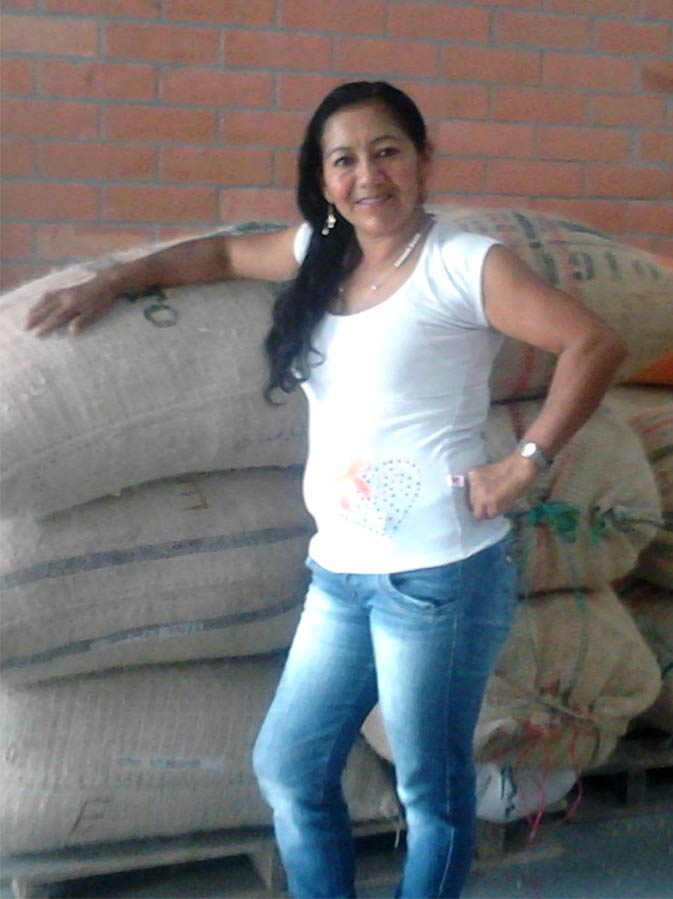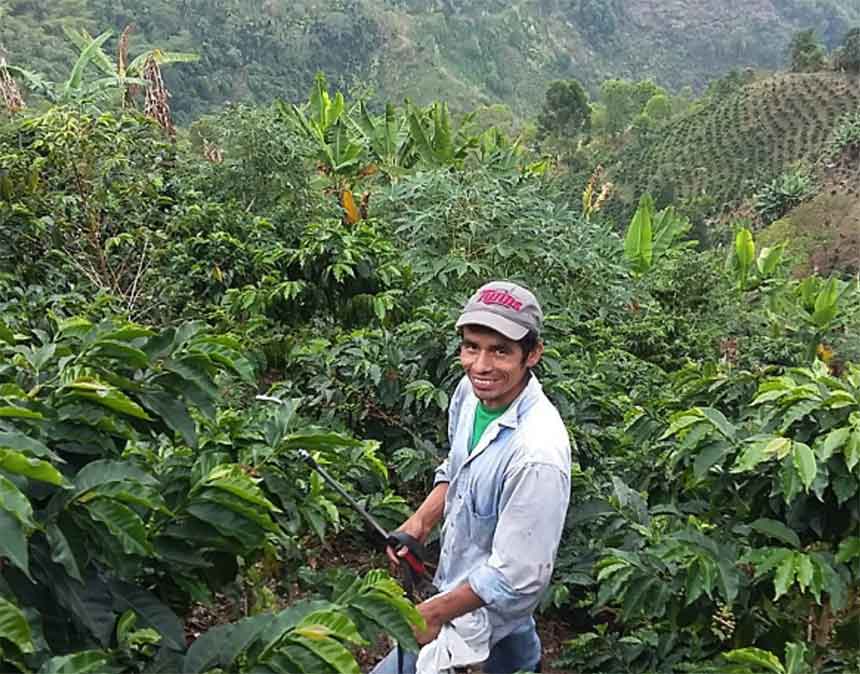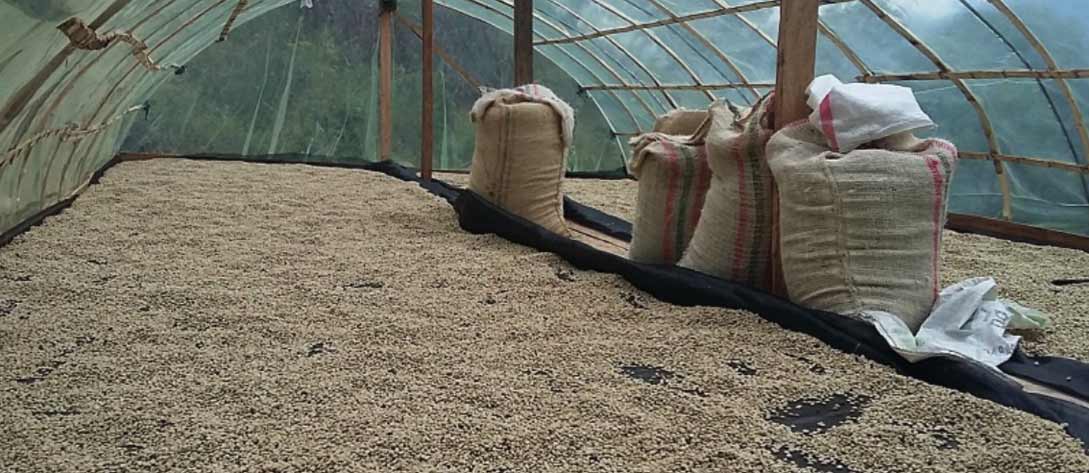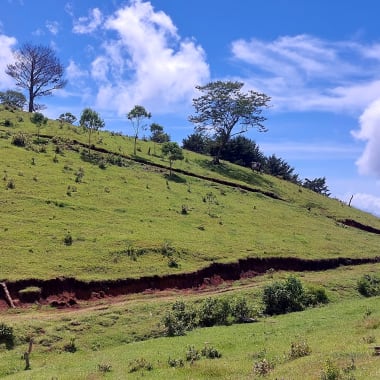-
Producer
-
Maria Edilma Medina
-
Country
- Colombia
-
Region
-
Gigante, Huila
-
Altitude
-
1700m above sea level
-
Varieties
-
Process
-
Importer
-
Caravela
-
Body
-
Medium
-
Acidity
-
Balanced
-
Tasting notes
-
Rose hip, mandarin, guava
-
Roast style
Colombia
Maria Edilma Medina
2016Maria came to Gigante nine years ago because of violence and conflicts elsewhere. Using savings and a bank loan, she bought La Esperanza farm in partnership with Elias and Isaias Lizcano. Elias is her father-in-law and he helps her to manage the farm and is in charge of all the quality inspections.
 Maria, alongside bags of coffee ready for transport. Photo: Caravela Coffee
Maria, alongside bags of coffee ready for transport. Photo: Caravela Coffee
At 1,700 metres above sea-level, La Esperanza is a relatively high altitude crop and has a total area of around nine hectares.
Last year she produced around 1,100kg of AA, AA+, AAA, and now ML, a grade which recognises microlots of very high quality coffee.
La Esperanza sits 1,700 metres above sea-level and is around nine hectares. After this year’s pruning to prevent leaf rust and ensure healthy future crops, she has 1,600 caturra trees in production and 2,000 castillo trees.
For Maria, the move from commodity coffee to specialty coffee was a great way to improve her life: the money she has received has helped to pay some of her debts and also to better provide for her family. Before focusing on specialty coffee she says it was difficult to take care of her farm because of a lack of money, but she’s now able to fertilise and make all roya (leaf rust) controls on time, further improving the quality of her crop.
 Photo: Caravela Coffee
Photo: Caravela Coffee
She’s proud to be producing specialty coffee and says she has learned a great deal. After studying the PECA education program run by our sourcing partners Caravela, Maria has better practices for managing the farm, with the higher quality crops being recognised by the market with much better prices.
Maria wants to improve in every lot she produces and hopes to continue having coffee that reaches ML (microlot) grades.
 Photo: Caravela Coffee
Photo: Caravela Coffee
Learn everything about this coffee:
Ethical, traceable sourcing
This page has all the sourcing information (variety, process, region, story, importer, and more) that our importers share with us, and give us permission to use.
The transparency helps us talk confidently about the quality and background of our product, and it helps you know exactly what you’re buying.
Learn more:
Coffee page transparency legend
Our coffee philosophy
Our business approach
Fresh harvest coffee
We only source and roast coffee from each country’s latest harvest season (so the green coffee is never older than 1 year from the time of picking, processing and packing). This ensures the sensory qualities are always at their peak and unaffected by excessive ageing.
Roasted for espresso and filter (best enjoyed black)
Roast style: omni. Omni roasts are designed to brew and taste great both as espresso and filter. Our omni single origins generally sit on Agtron values in the ~70-60 value range. So, technically, they are somewhere in the lighter side of the medium spectrum.
Designed for espresso and filter brewing. Best enjoyed black.
Learn more:
Our Loring Kestrel S35 roaster
Our roasting style and approach
Best brewed within days 15-49 post-roast
The ‘fresh is best’ saying doesn’t apply to coffee (contrary to popular belief). Waiting before opening and brewing your bag of whole coffee beans helps develop peak flavour and acidity.
But heads up: if you buy pre-ground coffee, brew it as soon as possible.
Learn more:
Our recommended brewing window
Try our custom brewing recipes
Our recipes and ratios are tailored to our coffee sourcing and roasting styles, bringing the best flavour and feel out of each coffee.
For pour over, immersion, and other filter brewing styles, check our brew guides.
For our espresso single origins, we recommend a coffee:yield ratio of 1:3:
- Dose: 20g ground coffee
- Yield: 60g espresso
- Total brew time: ~24-28 seconds
This is just a starting point! We encourage you to experiment, taste, and adjust to find the recipe that you enjoy the most.
Learn more:
Our espresso brew guide (single origin)
Brewing ratio calculator
Packaging and sustainability
- Bags: ABA-certified home compostable (AS 5810-2010)
- Labels: recyclable
- Valves (only on +250g bags): general waste
- Box and tape (online orders): recyclable
Learn more:
Our packaging
Varieties
Castillo variety
Castillo is named after the researcher Jamie Castillo, who helped develop the varietal in 2005 by Cenicafe, Colombia’s coffee research centre
Caturra variety
Caturra is a natural mutation of Bourbon that was originally discovered in Brazil in 1937, considered to be the first naturally occurring mutation ever discovered.
The location
Coffee from Colombia
Colombia is one of the largest coffee producers in the world and benefits greatly from having one of the most unique and complex set of micro-climates of all coffee producing nations.
The Huila region of Colombia
This region boasts the perfect combination of high quality soil and geography and is quickly becoming one of the largest coffee producing regions in Colombia. One of the best regarded regions for high quality, fruit driven coffee.
Farm processes
Washed process
Machines are used to remove the flesh from the coffee cherry before being fermented in water, washed again, and finally sun dried. This process tends to result in more distinct, cleaner flavours.
5 brew notes from subscribers
Colombia Maria Edilma Medina 2016
Andrew’s Chemex
- 24g
- 312ml
Colombia Maria Edilma Medina 2016
Reuben’s V60
Sample Coffee Team
Incredibly sweet, light body, apple cider, tropical, Raspberry, so delicious!!
- 14g
- 240ml
- 3m 0s
Colombia Maria Edilma Medina 2016
Simon’s Aeropress
Sample Coffee Team
There's a nice guava juice flavour once the brew cools down.
- 90s
Colombia Maria Edilma Medina 2016
Alex’s French Press
- 17g
- 250ml
- 12m 0s
Colombia Maria Edilma Medina 2016
Simon’s Espresso
Sample Coffee Team
Really well balanced, with a bit of apple and blackcurrant flavour coming through.
- 20g
- 26s

Subscribe to a world of coffee
Discover a new single origin coffee from Sample every 1-5 weeks with no delivery fees.
No up-front purchase, and you can pause, cancel, or change plans at any time.
Available to order online this week:

Peru Miguel Estela
Flavours of honeydew melon, white grape, marmalade
Body Acidity
Washed Marshell
August 2025 harvest
Roasted omni for filter and espresso
Peru Miguel Estela online
Colombia Rigoberto Chavarro
Flavours of brown sugar, wine gum, candied stone fruit
Body Acidity
Washed Pink Bourbon
February 2025 harvest
Roasted omni for filter and espresso
Colombia Rigoberto Chavarro online
El Salvador Manuel Castañeda
Flavours of toffee apple, cranberry, dulce de leche
Body Acidity
Honey Pacamara
March 2025 harvest
Roasted omni for filter and espresso
El Salvador Manuel Castañeda online
Ethiopia Tadese Teko
Flavours of bergamot, mandarin, mango
Body Acidity
Washed Ethiopian Heirloom
January 2025 harvest
Roasted omni for filter and espresso
Ethiopia Tadese Teko online